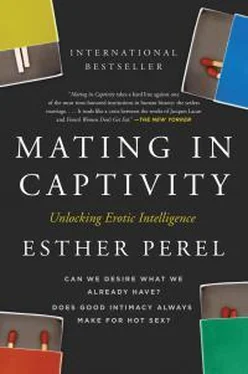I encourage Mitch and Laura to listen to each other with greater empathy. Mitch begins to understand that Laura’s alienation from her body has nothing to do with him. This eases his sense of rejection and his anguish about being unable to please her. While it is clear to Mitch that his desire is rooted in love, he needs to help Laura trust the sincerity of his interest in her. Far from seeking a selfish discharge, he longs for union.
For her part, Laura learns something equally crucial about Mitch—that when the language of words fails him, as it invariably does in the realm of emotion, he communicates with his body. She’d always felt that Mitch’s “itch for the horizontal” had little to do with her; it was just raw physical release. As she hears him, she sees that Mitch needs physicality to voice his tenderness, his yearning to connect. Only in sex does he feel emotionally safe. By limiting him to her own nonphysical language, to the exclusion of his sensual language, Laura has stifled his ability to “speak” to her. She blinds herself to her husband as he really is, and at the same time reinforces the very behaviors she rails against. When Mitch is reduced to using a truncated language of words, the romantic lover disappears and the bully emerges.
Mitch and Laura exemplify two extremes on the mind-body continuum. Couples are often configured on opposite sides of this divide. There are those for whom the body is like a prison in which they feel confined, self-conscious, and self-critical. The body is an inhibited site, awkward and tense. Play and inventiveness have no place there. Words feel safer than gesture and movements, and these people take refuge in speech. When reaching out to others, they prefer the verbal route. Then there are those for whom the body is like a playground, a place where they feel free and unrestricted. They retain the child’s capacity to fully inhabit their bodies. In the physical realm, they can let go; they don’t have to be responsible. They are often the partner in the relationship who wants more physical intimacy. It is especially during lovemaking that they are able to escape their inner rumblings. For them, sex is a relief that puts a halt to their anxiety; for their more verbal partners, sex turns out to be a source of anxiety.
As a therapist, I seek to make each partner more fluent in the language of the other. Laura’s experience has robbed her of the capacity to recognize the body’s vocabulary. Like many women, she battles the age-old repressions of female sexuality that have trapped women in passivity and made us dependent on men to seduce and initiate us into sexuality. Economic and professional independence notwithstanding, Laura remains sexually dependent. She leaves it to Mitch to figure out what she wants. Together, we explore the tortuous conflicts between desire and denial, wanting and not having, gratification and repression. I invite Laura to engage with her fantasies, to own her wanting, and to take responsibility for her sexual fulfillment. I steer her attention to her physical self, and challenge her to break through the vigilance, the guilt, and the disavowal that surround her sexuality. Can she look her mother straight in the eye and still maintain a sense of herself as a sensual being? Can she indulge in her own eroticism and declare the “nice girl” officially void?
When I suggest to Mitch and Laura that they’re trapped in a language with too little imagination, an alphabet too limited to contain their erotic life, Mitch bursts into tears. “I’m not angry,” he says of all the times that his frustration has led to mean, hurtful words; “I’m heartbroken.” I ask Laura to just hold him and I leave the room for a few minutes to give them the chance to connect through the purity of physical touch.
When I return, they’re practically falling off opposite ends of the couch, a yawning gulf between them. When I ask what happened, they immediately backslide to the tried and true mutual blame that got them here in the first place. “I tried, but he…” “I wouldn’t have if she hadn’t…” I realize that my intervention was more an expression of my own hope than any intention on their part. They weren’t ready.
Realizing the futility of any more talk, in the months that followed I tried several different approaches, most of which relied on physical interactions rather than verbal ones. I had them lead each other around the room, trying out different arrangements of leaders and followers: cooperation, resistance, and passivity. I had them fall backward into each other’s waiting arms. I had them stand face-to-face and push against each other with their open hands. I had them mirror each other’s movements. The conversations that followed the games became gradually more revealing, less critical, and even more playful. By giving a physical but nonsexual representation to their emotional impasse, they were able to see their patterns of resistance.
“I can let him get close,” Laura admits, “but not too close. I trust him, but only so much. I always hold back, don’t I?”
“When you doubt your own desirability, it is harder to trust Mitch’s desire for you.” I explain. “It’s far easier to locate the fault with him—and, to be fair, he gives you plenty to work with—than it is to face the depth of your own self-doubt.”
Mitch, who had been pointing to Laura’s sexual passivity for years, had some realizations of his own. “I guess I’m not too creative, either. When we were doing the exercise, I felt uncomfortable taking the lead. I hate to admit it, but I liked the passive resistance most. I’m unbeatable at that one.” I reminded Mitch that when he met Hillary, his first love, she too took the lead. “You do indeed express yourself with great eloquence in the physical realm, but you’re highly dependent on a powerful interlocutor to make it safe for you. So far, Laura hasn’t been that.”
When Mitch and Laura came to me, I was reluctant to take them on. They considered me the therapist of last resort; I was either the third or the fifth (I can’t remember which) they had consulted in more than two decades. For years, they had been trying to talk their way out of their rut. Evidently, it hadn’t worked. Instead they were engaged in a verbal thrust-and-parry, defensive, hostile, and totally fused. They had had plenty of self-disclosure, but it was far from intimate.
I knew enough not to limit myself to the habits of the talking cure—talking had become squawking and was going nowhere. The exercises provided an alternative lens to examine their dynamics. The physicalization of their problems gave us a fresh text to read together. It was novel enough to jar them, and to interrupt their entrenchment. They were stretching into new territory.
In my work with patients I stress that intimacy isn’t monolithic; nor is it always consistent. It is intermittent, meant to wax and wane even in the best relationships. The family therapist Kaethe Weingarten steers us away from looking at intimacy as a static feature of a relationship; she sees it instead as a quality of interaction that takes place in isolated moments and that exists both within and without long-term commitment. There’s the synchronization of dance partners, the sudden identification between strangers on a plane, the solidarity of witnesses to a catastrophe, the mutual recognition of survivors—of breast cancer, alcoholism, terrorism, divorce. There’s the intimacy between professionals and those they serve—doctor and patient, therapist and client, stripper and regular. While we expect to experience these discrete moments of recognition in ongoing relationships, they are not necessarily bound to any overarching narrative. They can be circumstantial, spontaneous, and without follow-up. Informed by Weingarten’s ideas, I no longer look at relationships as being either intimate or not. Instead, I track each couple’s ability to engage in a series of intimate bids tendered over time.
Читать дальше










